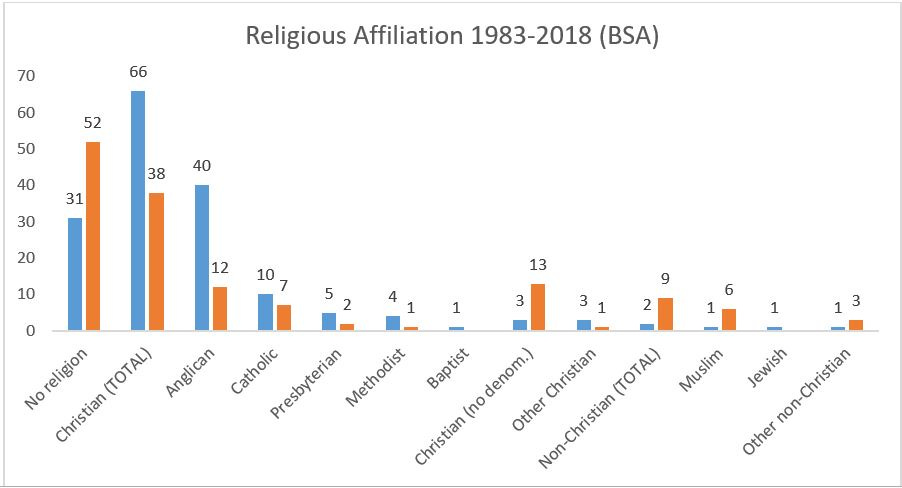How and why the Internet is causing the demise of traditional organized religion
The Spotlight Effect is powerful force, magnified exponentially by technology
I saw the below chart being shared the other day created by Twitter user Ryan Burge, and it went reasonably viral so I’m using it as a reason to bring up a topic I’ve spent time thinking about for many years. This chart indeed validated a thesis I was talking about over 15+ years ago now: that the internet would mark the end of the major organized religions of the past (or at least put their futures gravely into question). As a sidenote, we seem to be replacing them with a long tail of tribes everyone has their feet in several of concurrently, but that is a topic for a different post.
Let’s dig into what’s going on with the decline of traditional organized religion, plus add some fresh thinking on this topic.
Again, I previously explored why organized religion is easily one of the best examples of the efficacy of marketing in many blog posts, columns and talks in the early 2000s (shared belief structures, logos, belonging, “in group” tribal messaging, etc, this is not new ground and fairly understood - even ‘cult of mac’ users constitute a religion). This is important to understand before you go on. Before we get to the fun concepts for today, let’s be a bit dry and talk about what the internet technically has changed (then we’ll go through the philosophical implications of why that change mattered a lot).
The 2 technical mechanisms by which the Internet is accelerating the decline of religion:
1. We are splitting the world vertically by interest category (psychographics rule, demographics become somewhat less important)
As a digitally-savvy generation grows up connected to each other, to research and to a myriads of opinions, they are nurturing a media-literate culture capable of critical thinking and independent decision making. Such a group is less likely to accept what they are taught as fact without evidence.
Instead of religion which is in a sense horizontal, the web is splitting the world and our time vertically: connecting us around common interests we are passionate about (us marketers have a fancy word for this: psychographics, and if you doubt their power at influence and persuasion through using them to target messaging, take a glance at Facebook’s market cap). Anyway, whether sports, music, knitting or other interest, we now have a mechanism to create communities around anything. Not simply a common religious belief that was passed down to by our tribes. We are breaking down our culture on a more specific level of interest in a fashion that is location agnostic.
2. We are building ongoing, updated databases of referential content
Religions, especially the extra devout variety, aren’t exactly know for their malleability and change. Through link journalism, the web is spreading the notion of referential (verifiably so) content. Despite the media’s unfortunate rush to publish both correct and (mis)information, scientists, researchers and professors are making available a volume of content in the public domain never before possible and the truth and the bullshit all make it out there. Many, many versions of them. Individuals and amateur subject matter experts are going steps further by adding context. Future generations will benefit from a more threaded and nested library of content that is instantly accessible. It doesn’t even have to be 100% correct, no complex system ever is 100% flawless whether technical or natural: we can refine over time and strive to simply continue to do better. Including a history of current and past religious beliefs alongside scientific data.
Before we get into some concepts that ties the change of information distribution together with our minds, a question many are posing: when will we shed religion completely? Will we ever?
I also came across another piece of research, quite specific, predicting religion will disappear completely by 2041. That data is also supported by research from PEW, showing the consistent upward trend of non-religious.
If you were to extrapolate this out to 2041 and consider how the increasing spread of information is accelerating the disruption of archaic beliefs, perhaps 2041 is not too optimistic. The data being shared more recently seems to indicate PEW may even have been underbidding this trend. Impossible to say if the religions we know today are terminal zeros, but the trend against them is not slowing down.
Two more recent charts I found include the following:
So, what’s going on exactly in everyone’s psyches? Let’s explore the philosophy of what’s happening and why many, many more of us are rejecting organized religion
No matter how you want to slice it, fewer people are packing into temple and church on Sundays, instead opting to go full Homer, enjoying their weekends to the fullest and practicing spirituality in their own unique, beautiful, social, public, private and creative ways.
This is via a classic Simpsons episode where Homer skips church via the following rationale. I don’t see a flaw in it (enjoy that clip here):
“What’s the big deal about going to some building every Sunday? I mean, isn’t God everywhere? And don’t you think the almighty has better things to worry about than where one little guy spends one measly hour of his week? And what if we pick the wrong religion? Every week we’re just making God madder and madder.”
Anyway, enough about Homer or the trends above, I am not so interested in when particular inflection points are reached that cause an accelerated decline in organized religion. I am more fascinated by why it’s happening. The actual dates for these things would be impossible to get exactly right anyway, so not sure why are people trying to throw darts at this one.
We’ve all been seeing the change around us first-hand. I’ve heard consistent stories in my personal life from friends, colleagues and relatives of how religion simply is no longer relevant for their happiness, cultural / lifestyle choices and altogether incongruent with the world around them. In many cases, this is of course due to the spread of information on how the universe actually works (or, simply put: historical truths unveiled).
A previous NY Times story titled: Some Mormons Search the Web and Find Doubt brings this to life:
When fellow believers in Sweden first began coming to him with information from the Internet that contradicted the church’s history and teachings, he dismissed it as “anti-Mormon propaganda,” the whisperings of Lucifer. He asked his superiors for help in responding to the members’ doubts, and when they seemed to only sidestep the questions, Mr. Mattsson began his own investigation.
But when he discovered credible evidence that the church’s founder, Joseph Smith, was a polygamist and that the Book of Mormon and other scriptures were rife with historical anomalies, Mr. Mattsson said he felt that the foundation on which he had built his life began to crumble.
…around the world and in the United States, where the faith was founded, the Mormon Church is grappling with a wave of doubt and disillusionment among members who encountered information on the Internet that sabotaged what they were taught about their faith, according to interviews with dozens of Mormons and those who study the church.
Of course, it’s not just Mormons, it’s all religions. Reading this story and considering the larger trend of religious disruption, it became clear to me recently why the Internet is so powerful here: it’s due to its potency of dissolving “The Spotlight Effect.” I learned about this idea from researchers Chip and Dan Heath in their thought-provoking book: Decisive: how to make better choices in life and work.
So, what exactly is the Spotlight Effect? We are quick to jump to conclusions because we give too much weight to the information that’s right in front of us, while failing to consider the information that’s just offstage (or onstage but not lit up). Nobel-prize winning psychologist Daniel Kahnemen called this tendency “what you see is all there is.” Keeping with Kahneman’s visual metaphor, Chip & Dan refer to this tendency as the Spotlight Effect (think of the way a spotlight in a theater directs our attention; what’s inside the spotlight is crisply illuminated). Of course, a spotlight only lights a spot. Everything outside it is obscured and might as well not even exist.
When exposed to religion at a young age, many in the past would just succumb to the spotlight effect and be done with it. It’s what they see, it’s their world, it’s what was told to them, it feels like the right decision to believe, feels authoritative, so it must be true. Pink Floyd has some timeless song lyrics about this. But the sharing of information enabled by the Internet is making it increasingly difficult to ignore objective reality. What happens when the entire room is illuminated and we see the world is not flat? That monsters don’t exist in the dark, that the universe is governed by physics, not Ra the sun god. It becomes clear no one is in control over our reality but ourselves. We are forced to adjust our beliefs. We learn to question the world (this, questioning everything, should be instilled in everyone from a young age).
And the thing is, we’re waking up to the fact which frightens some and inspires others, that we have no idea why we’re here. This quote from the Mythbuster’s Adam Savage has always been a favorite of mine. Why are we so afraid we might be alone in the universe? After all, we are simply the universe coming to understand the universe is a thing.
Watching this all unfold and the change of our society is fascinating to me as a student of psychology, sociology and human nature. In the future (and the present, for many) it’s ever-increasingly a [citation needed] world. We need to embrace this personally and professionally and be ready to source with definitive research and data why our decisions make sense, our products should be sold and our ideas accepted. And this is a good thing for everyone.
This does not mean we give up the positive aspects of religion such as family gatherings, community events, meditative rituals and spread lessons and stories that clearly serve an archetypal good for both society and ourselves. But letting go of all the dogma and archaic practices almost certainly seems like it would lead to a better future.
With that said I also strongly support everyone having the freedom to believe what they like and helps them find peace. It’s possibly a great answer for you (if it continues into the future, the trend lines don’t look great) even if it isn’t right for me. And you know, if everyone thought like this and we already evolved our beliefs, perhaps religions wouldn’t still be so contentious in the first place (as they continue to harm citizens via restricting access to women’s reproductive health etc). After all, ideas, just like biology, must be in a constant state of evolution to survive changing environments.








